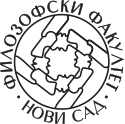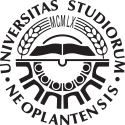| Contents of lectures |
Glossary and cognitive style: 1. The most important general linguistic concepts and cognitive style, 2. Metaphors and models in scientific discourse. 3. Linguistics as a discipline that describes and explains the structure of languages and the functioning of languages in the context of the context. Systematization of linguistic science: 1. Approach: 1.1 Developmental qualities - (a) Eurocentricity, (b) Contextualization, (v) Cyclicality, (g) Paradigmatic, 1.2 Scientific objectives - (a) Explanation, (b ) Description, 1.3 Changes in the knowledge of the subject - (a) Quantitative insights, (b) Qualitative insights, 1.4 Disciplinary guidelines - (a) Subject, (b) Titles, (v) Methods / Techniques, (g) / Terminological / Symbolic apparatus, (d) Theories / hypotheses, (f) Objectives, (e) Status; 2. Approach: 2.1 General trends in the development of discipline, 2.2 The process of independence of the discipline, 2.3 The epoch in the history of discipline, 2.4 The development of discipline in the 20th century, 2.5 Interdisciplinarisation = Contextualization, 2.6 Among the sciences; 3. Access: 3.1 Language science on the XIX-XX century; 4. Access: 4.1 The science of language in the Europe-America relationship; 5. Access: 5.1. Science of language on the relation XX - XXI century, 5.2 Science on language today, 5.3 Science of Language in our country. |

